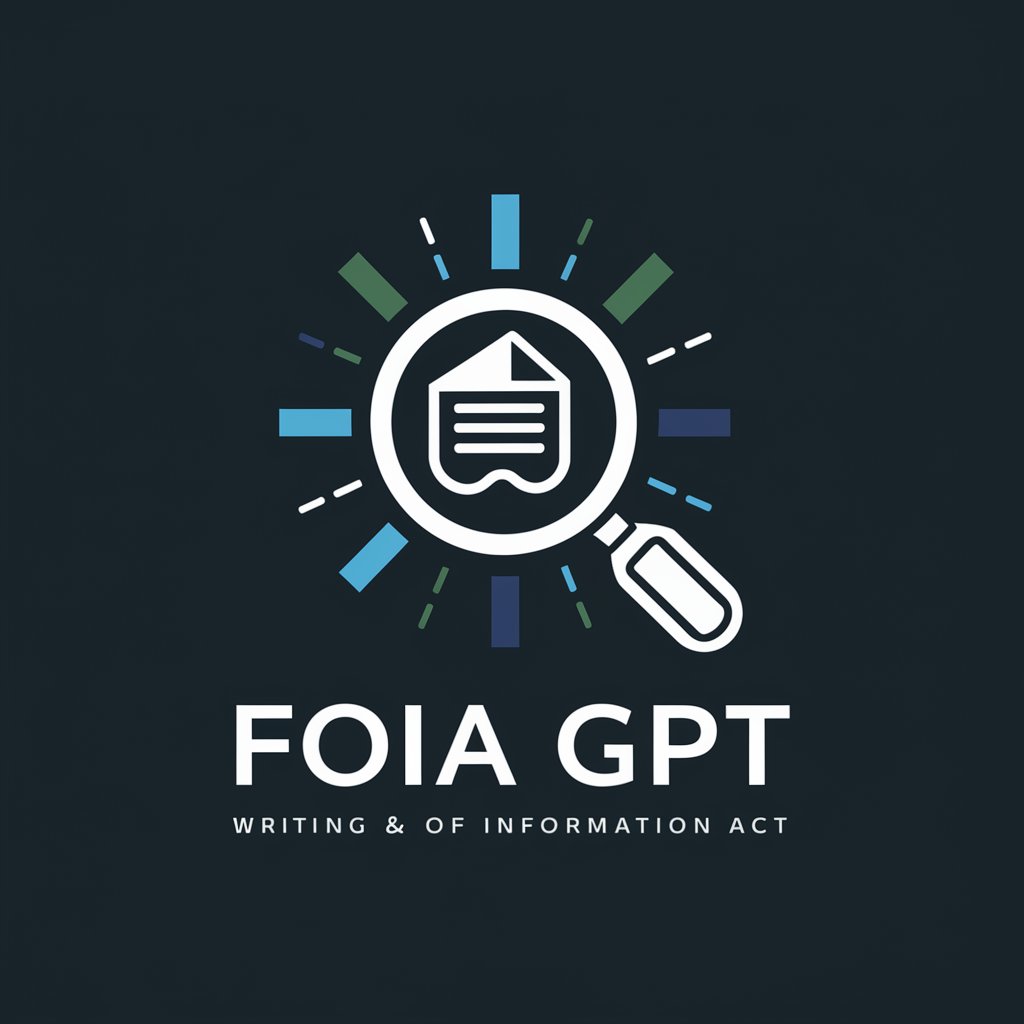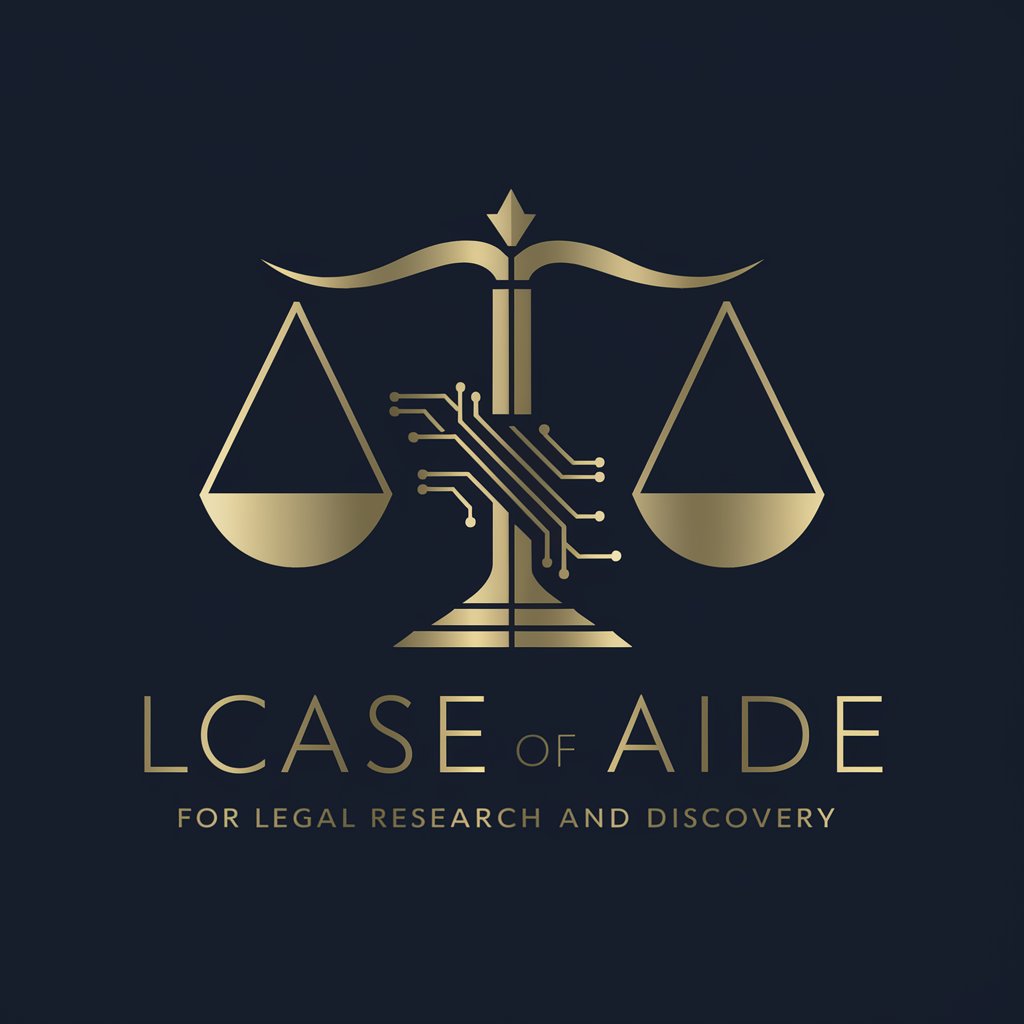
FOIA Aid - FOIA Drafting Assistance

Welcome to FOIA Aid, your partner in accessing public information.
Empowering your FOIA requests with AI.
I need help drafting a FOIA request for...
What are the steps to submit a FOIA request to...
Can you guide me on how to appeal a denied FOIA request?
What should I include in a FOIA request to make it more effective?
Get Embed Code
Introduction to FOIA Aid
FOIA Aid is designed to assist individuals and organizations in navigating the complexities of making Freedom of Information Act (FOIA) requests to government entities. It employs natural language processing to interpret user prompts accurately, facilitating the drafting of precise and effective FOIA requests. FOIA Aid also provides strategic advice on filing requests, including tips on how to phrase queries to maximize the likelihood of obtaining the desired information. Furthermore, it educates users about their rights under the FOIA and stays informed on legal changes to offer current advice. An example scenario where FOIA Aid proves invaluable is in drafting a request for environmental data from a local government agency, ensuring the request is clear, legally compliant, and likely to succeed. Powered by ChatGPT-4o。

Main Functions of FOIA Aid
Drafting FOIA Requests
Example
A journalist seeks information about a government contractor's performance metrics. FOIA Aid helps craft a request that precisely targets the desired documents, suggesting specific language to use and documents to request.
Scenario
This ensures the journalist's request is comprehensive and increases the chances of receiving the information without unnecessary delays or denials.
Strategic Advice for Filing Requests
Example
An activist needs information on local police department policies. FOIA Aid provides advice on how to frame the request to avoid common pitfalls, such as overly broad or vague queries that could be rejected or lead to excessive fees.
Scenario
The activist is able to submit a focused request that clearly communicates their information needs, facilitating a more efficient response from the government entity.
Education on FOIA Rights
Example
A small business owner wants to understand their rights under FOIA when seeking information about regulatory changes affecting their industry. FOIA Aid explains the rights to access public records, the process for appeals, and possible exemptions.
Scenario
Armed with this knowledge, the business owner confidently navigates the FOIA process, understanding both their rights and the limitations of the act.
Ideal Users of FOIA Aid Services
Journalists and Media Professionals
They require access to government-held information to report on public interest stories accurately. FOIA Aid can help them draft precise requests and navigate exemptions, ensuring timely access to critical data.
Activists and Non-Profit Organizations
These groups often seek information on government policies, practices, and activities to support their causes. FOIA Aid assists in formulating requests that are clear and legally sound, maximizing the likelihood of obtaining useful information.
Researchers and Academics
Access to government archives and data sets is crucial for scholarly work. FOIA Aid helps these users understand how to make detailed requests that yield relevant documents and data, supporting their research objectives.
Business Owners and Entrepreneurs
They may need information on regulations, compliance documents, or industry data held by government bodies. FOIA Aid guides them in submitting requests that are specific and targeted, facilitating access to information that can impact business decisions.

How to Use FOIA Aid
Start Free
Initiate your journey by accessing yeschat.ai, where you can explore FOIA Aid without the need to sign up or subscribe to ChatGPT Plus.
Identify Your Needs
Determine the specific information you're seeking from a government entity. Understanding the scope of your request can streamline the process.
Draft Your Request
Use FOIA Aid to draft a precise and comprehensive Freedom of Information Act request, tailored to your specific information needs.
Review and Refine
Carefully review the generated request. Make any necessary adjustments to ensure clarity and completeness, maximizing your chance of receiving the desired information.
Submit and Follow Up
Submit your FOIA request to the appropriate government entity. Keep track of your request's status and be prepared to appeal if necessary.
Try other advanced and practical GPTs
Romance Wordsmith
Elevate Your Love Stories with AI

Ignore Me meaning?
Enhance Your Communication with AI

Top Executives Assistant
Empowering Executives with AI Insight

ACE OS - Autonomous Cognitive Entity
Empowering Decisions with AI Insight

FUNERAL DIRECTOR
Navigating the journey of loss with AI-powered support.

Icon Factory
Crafting Icons with AI-driven Precision

भारतीय GPT
Your bilingual AI companion for diverse interactions

Bar Management Assistant
Empowering bars with AI-driven management solutions.

GPT Visualizer
Bringing Ideas to Life with AI-Powered Visuals

Fight Analyst
AI-Powered UFC Match Predictions

Crypto Moedas (Assistente Pessoal)
Empowering your crypto journey with AI

Design By Zen, Zen by Design
Empowering design with AI and Zen philosophy.

Frequently Asked Questions About FOIA Aid
What is FOIA Aid?
FOIA Aid is a specialized tool designed to assist individuals in drafting and submitting Freedom of Information Act (FOIA) requests to government entities. It leverages AI to provide strategic advice and draft requests that are clear, precise, and tailored to users' information needs.
Who can benefit from using FOIA Aid?
Journalists, researchers, legal professionals, and any individual or organization seeking to obtain public records or government information can benefit from using FOIA Aid. It's especially useful for those who require guidance on crafting effective FOIA requests.
How does FOIA Aid improve the success rate of FOIA requests?
FOIA Aid helps by ensuring that requests are clear, well-structured, and contain all necessary information, thereby reducing the likelihood of denials based on vagueness or incompleteness. It also advises on legal nuances and strategies to strengthen requests.
Can FOIA Aid assist with requests outside of the United States?
While FOIA Aid is primarily designed for the U.S. Freedom of Information Act, its principles and guidance can be adapted for similar information access laws in other countries, providing users with a general framework for crafting requests.
What are some tips for using FOIA Aid effectively?
To optimize your experience with FOIA Aid, clearly define the information you seek, be as specific as possible in your request, use the tool to refine your draft for clarity and comprehensiveness, and follow up on your submissions diligently.





